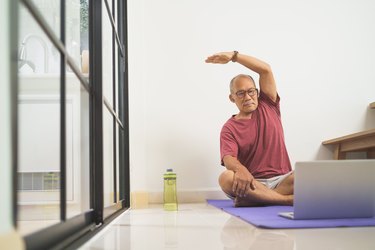
There's no shortage of expert recommendations on things you should do to support your mobility and balance as you get older. But what do the experts who dole out the advice actually do themselves?
Many, as it turns out, practice what they preach. Physical and occupational therapists — who help patients improve movement to enhance their quality of life — aim to age gracefully with healthy standbys like exercising regularly, eating a wholesome diet, getting enough sleep and managing their stress.
Video of the Day
Video of the Day
Here, we tapped five therapists to learn more about their go-to habits to stay strong and limber in the face of Father Time. Here's what they had to say, plus how you can follow their lead.
1. Make Resistance Training a Regular Thing
All of the experts who weighed in for our story agreed on one thing: Strength training (in the morning or any time of day) is a must. Regular resistance exercises can reduce age-related muscle loss, so you stay stronger for longer. It also keeps your bones sturdy, reducing the risk for fractures in the event of a fall, and make it easier overall to move through your day.
"As I've gotten older, resistance training helps my joints feel less stiff, my energy and mood up and keeps the soft tissues more toned," says Karena Wu, PT, DPT, owner of ActiveCare Physical Therapy in New York.
"I incorporate resistance training into my workout routine one to three times per week, for a total of 30 to 60 minutes per week," says Tanner Neuberger, PT, DPT, clinic manager for Athletico Physical Therapy in Waukee, Iowa. Neuberger recommends starting off with body-weight exercises if you're new to resistance training, since you can do them at home without any equipment. These body-weight moves work for every fitness level.
2. Put Protein First
Chris Erickson, DPT, of EHS Physical Therapy and Chiropractic, makes it a point to have a source of lean protein — like poultry, lean red meat, seafood, eggs or beans — at every meal.
Protein-rich foods (especially these picks) help you hang onto more muscle, Erickson says. They'll also keep you fuller longer, which can help prevent snacking and make it easier to avoid age-related weight gain.
3. Keep Up With Cardio
Regular aerobic exercise keeps your heart and lungs functioning at their best, protecting your stamina to perform everyday activities like climbing the stairs, playing with grandkids and joining friends for a walk in the park.
"We recommend getting about 150 minutes of meaningful exercise per week, but even five to 10 minutes of slow jogging per day has been shown to reduce mortality risks," Neuberger says. You don't have to lace up your running shoes though — these activities all count as cardio, too.
4. Say Yes to Yoga
"In order to stay strong, flexible and have good balance, I practice yoga regularly," says New York-based physical therapist Shannon Leggett, PT.
Not only can yoga help reduce the risk for debilitating falls, but it may also make it easier to get back up if you do stumble. "If you think about any variations of a sun salutation, they are a perfect way to transition on and off the floor," Leggett says.
Similar stability exercises like Pilates can yield a similar benefit, Wu says. "They help keep the low back and pelvis stable and strong to power the limbs," she says. If you're new to yoga, these beginner-friendly poses can help you get started.
5. Take a Walk After Dinner
Nightly strolls after eating are a must for Rochester, New York-based occupational therapist Brittany Ferri, PhD, because they help her sleep better. First, they improve digestion, reducing the chance for snooze-time disruptions from an upset stomach or heartburn.
"They also help me wind down before bed," she adds, helping her fall asleep easier when her head hits the pillow.
6. Get Enough Sleep
Getting adequate rest is important at every age, but as you get older, it can mean having enough energy to get through the regular workouts that are key for maintaining your fitness, strength and balance, Erickson says.
"I get eight hours of sleep for body recovery and brain recovery, and I go to bed at the same time every night and wake up at the same time in the morning," Erickson says.
7. Find a Stress Reliever That Works
Staying on top of your stress levels won't just help you feel better emotionally. It can actually help you live longer, Neuberger says. "Stress happens to everyone, but there are ways you can mitigate it," he says. "Walks through nature, mindful meditation and yoga can all be helpful."
These short daily rituals can make a difference, too.
Is this an emergency? If you are experiencing serious medical symptoms, please see the National Library of Medicine’s list of signs you need emergency medical attention or call 911.





